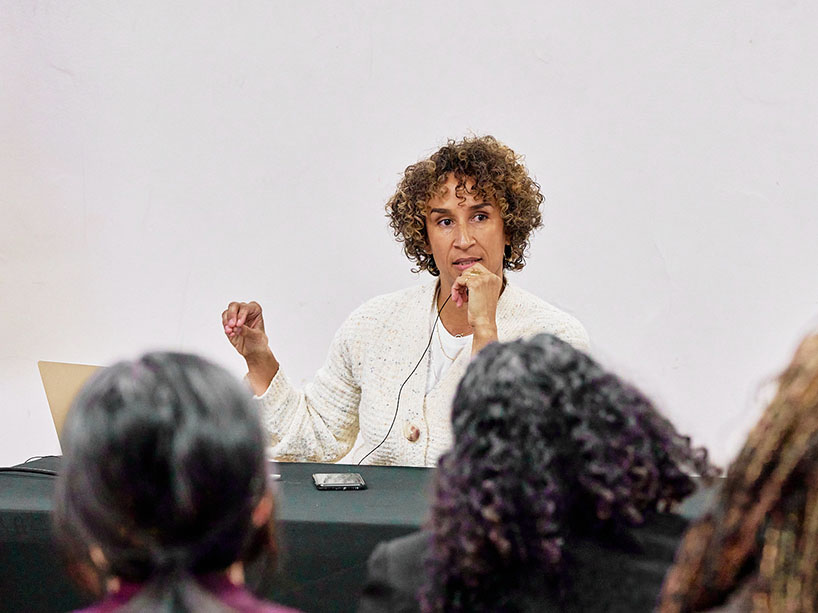How do we cultivate strength in uncertain times?

Danielle Smith, RMT, talks about somatic integration at an event in the fall.The event was organized by the Office of the Vice-President, Equity and Community Inclusion (OVPECI) in collaboration with the Community Building Working Group, Community Wellbeing and Athletics and Recreation. Images by Esi Photo
Whether it be the impacts of ongoing global conflicts, political uncertainties, or events closer to home, many of us may feel that 2025 is already proving challenging. And so, while we hope for transformation and growth, we might also find ourselves feeling unbalanced in a world that seems increasingly unpredictable. How can we transform our insecurities in this uncertainty into strength?
Cultivating safety within: resilience beyond ‘endurance’
At a TMU workshop in the fall of 2024, Embodied Learning in Uncertain Times, somatic integration practitioner, Danielle Smith, acknowledged that the compounding stressors we face in our day-to-day lives can leave us feeling overwhelmed and cause varying degrees of trauma.
Trauma can be the result of exposure to situations that feel like they are too much, happening too fast or going on for too long; it can also arise when we experience stressful events without adequate and compassionate support or validation from others.
With this in mind, Smith invited participants to think about how the body, through its responses to prolonged stress or uncertainty, can itself become a site of trauma. In other words, chronic stress can cause a large amount of emotional, psychological and even physical wear and tear.
Regulating our bodies and reducing the long-term stress we experience is key to thriving in body, spirit and mind.

Somatics involves increased awareness of how trauma, joy and a sense of belonging manifest in our bodies.
Mindful movement as a form of decolonizing wellness
Smith explained that human beings exist within social frameworks structured by relational power, rank and privilege. These systems of power — and oppression — determine our health because they cause certain groups and individuals to experience social and environmental stressors in different and more affecting ways than others.
Colonialism’s deep roots are embedded in the structures of Canada’s social systems and determine health outcomes in populations that have experienced colonization. For example, diabetes is prevalent in Indigenous communities; Black populations have higher rates of heart disease.
Somatic practices are inherently decolonial because they are grounded in Indigenous teachings and traditional ways of knowing, which we have been disconnected from through colonization.
Somatics involves awareness of how trauma, joy and a sense of belonging manifest in our body. Somatic practices, such as mindful movement and body-based therapies, can help us regulate our nervous system and work toward a calmer and more grounded state. In doing so, these exercises help our body become a site of safety, empowerment and self-trust, allowing us to reconnect with ourselves and each other as well as build the capacity and resilience to navigate and begin to heal through troubling times.
Personal and collective change happens when safety is felt. We can cultivate safety within each of ourselves rather than only trying to achieve safety by controlling our surroundings, which are so often unstable.

Smith encouraged participants to observe the different sensations in their bodies. Participants reported increased awareness of pain, tension and even joy in their bodies.
Tools to promote well-being
Somatic practice does not involve lengthy periods of static poses. Instead, it encourages active (re)engagement with the body and mind through movement and increased awareness: We can orient ourselves in a space by observing our environment; we can lightly tap our bodies or even wrap our arms around ourselves, providing a sense of physical containment, to bring comfort and grounding.
Somatic practice can also be applied in a community environment to address trauma. We can promote healthy attachment with others through compassionate actions such as listening with kind eyes, offering a safe touch or fostering community through shared meals or stress-releasing exercises like dancing.
In these small yet affirmative actions, we can cultivate self-sovereignty, reclaim our connection to our bodies and practice collective care. We can reconnect with the essence of what it means to be human.
Smith’s workshop offered theoretical and practical tools to support individual and collective well-being, inviting participants to cultivate a sense of internal safety and connect to the brilliance of our bodies.
Participants responded that once they moved past discomfort or fear of connecting deeply with their bodies, they gained a greater awareness of their mind-body connection. They could sense the possibility of overcoming, and perhaps even transforming, sources of stress.

Tanya (Toni) De Mello, vice-president, OVPECI, acknowledged that ongoing global conflicts, stress and uncertainty continue to impact the TMU community.
Community Building Working Group
The workshop was supported by the Community Building Working Group, in collaboration with the Office of the Vice-President, Equity and Community Inclusion.
The working group aims to take both proactive and responsive approaches to support students, faculty and staff at TMU who are affected by multiple ongoing geopolitical conflicts. The objectives of the working group are to:
- Support individual and community well-being
- Build trust, belonging and positive engagement across the university community
- Strengthen capacity for navigating difficult conversations and conflict resolution